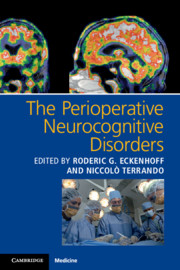Book contents
- The Perioperative Neurocognitive Disorders
- Reviews
- The Perioperative Neurocognitive Disorders
- Copyright page
- Contents
- Contributors
- Preface
- Section 1 Cognitive Function in Perioperative Care
- Section 2 Pathophysiology of the Perioperative Neurocognitive Disorders
- Section 3 Symptomatology and Diagnosis for the Perioperative Neurocognitive Disorders
- Section 4 Clinical Recommendations and Prevention
- Chapter 14 Preoperative Testing to Identify Vulnerable Subgroups
- Chapter 15 Informed Consent and Cognitive Impairment
- Chapter 16 Perioperative Neurocognitive Disorder Mitigation Strategies
- Index
- Plate Section (PDF Only)
- References
Chapter 15 - Informed Consent and Cognitive Impairment
from Section 4 - Clinical Recommendations and Prevention
Published online by Cambridge University Press: 11 April 2019
- The Perioperative Neurocognitive Disorders
- Reviews
- The Perioperative Neurocognitive Disorders
- Copyright page
- Contents
- Contributors
- Preface
- Section 1 Cognitive Function in Perioperative Care
- Section 2 Pathophysiology of the Perioperative Neurocognitive Disorders
- Section 3 Symptomatology and Diagnosis for the Perioperative Neurocognitive Disorders
- Section 4 Clinical Recommendations and Prevention
- Chapter 14 Preoperative Testing to Identify Vulnerable Subgroups
- Chapter 15 Informed Consent and Cognitive Impairment
- Chapter 16 Perioperative Neurocognitive Disorder Mitigation Strategies
- Index
- Plate Section (PDF Only)
- References
- Type
- Chapter
- Information
- The Perioperative Neurocognitive Disorders , pp. 179 - 189Publisher: Cambridge University PressPrint publication year: 2019

